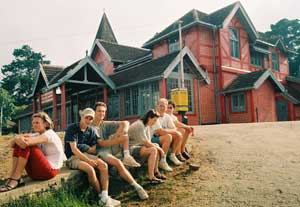Nuwara Eliya, also known as “Little England”, is officially 180 years old, and a big birthday bash is on the cards.
It was on August 11, 1828, that the then governor Sir Edward Barnes decided to build a holiday home for his soldiers in the salubrious climes of Nuwara Eliya. Set in the foothills of Pidurutalagala, Sri Lanka’s tallest mountain, and covering a land extent of 12 square kilometres. The scenic hill-country location was deemed ideal for rest and recreation. To the colonial Englishmen, Nuwara Eliya had “a touch of England” about it, and was seen as “a home away from home”.
 |
| Two famous landmarks: The Post office |
Over time, the town evolved into a popular holiday and weekend destination for Colombo city folk. Nuwara Eliya’s status as a mountain health resort and holiday town was reinforced when the English explorer, Sir Samuel Baker, established a 1,000-acre farm there in 1846. Many of the British here considered Nuwara Eliya the next best place to be after England, and saw it as an excuse for not going all the way back to Britain for a holiday.
It was not always holiday mood in Nuwara Eliya, however. There were the bad times too.
Between 1865 and 1870 the town was plagued by cholera, which killed four people, including the Chief Justice of the time. That rough experience prompted the authorities to set up a health and development centre in the town, in 1874.
By 1886, there were plans to seriously develop the area, with land-marking, and so on. The census of 1881 showed a Nuwara Eliya population of 1,791. Between 1880 and 1900, the town developed rapidly. A town development board was established in 1921, and this became a town council in 1932, and a municipal council in 1949. By now, the population had grown to more than 40,000.
Sadly, the glory days of Nuwara Eliya seem a thing of the past.
What was once a beautiful hill-country town is now a polluted and much disfigured urban centre. Over the past 25 years, many of the tall trees that lined the town’s highways and byways have been cut down. The beloved holiday venue has become a plaything for those engaged in dirty politics.
The future of this once beautiful town is under threat. Potato cultivation, introduced by Sir Samuel Baker, is no longer the popular revenue-earner it once was. Sir Samuel’s dream of making Nuwara Eliya the equal of the beautiful Neel Grans mountain range in India is a fast-receding hope.
Nuwara Eliya is a Lankan heritage town, and it is up to us to preserve its beauty and character for posterity. |

